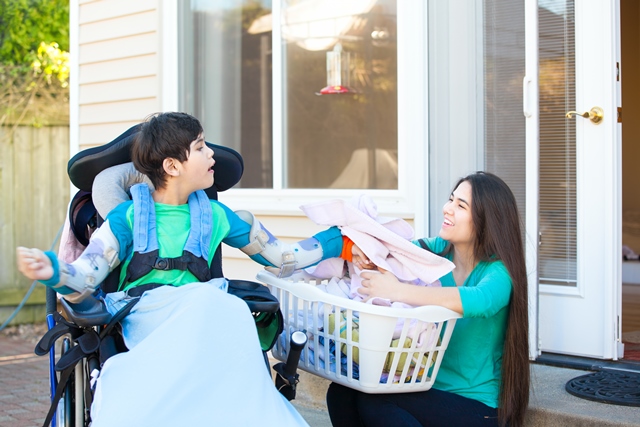Office of Integrated Health
What We Do

Mission: Supporting this life of possibilities by ensuring quality supports and a pathway to community integrated health services.To serve as a resource for information related to healthcare, wellness, healthcare providers, and health related services within the Commonwealth.
Since the opening of the first institution for “epileptics and the feeble minded”, Virginians involved in the care of persons with developmental disabilities (DD) have identified the gaps in services, living situation concerns, health care access issues, and even the terminology used to describe people with DD. There have been attempts over the years to effect change and improve access, but many were done at a regional level and failed to achieve widespread and lasting results.
The Office of Integrated Health (OIH) was established by the Department of Behavioral Health and Developmental Services (DBHDS) in response to these needs. Its purpose is to build and improve on those past efforts and find new, innovative ways to effect change, and decrease inter and intradepartmental barriers across agencies. Consistent with the strategic goals of DBHDS the OIH assesses the needs and resources available for providing needed health services and supports to persons with DD and serious mental illness (SMI) throughout the Commonwealth. The OIH currently oversees and is responsible for the Health Support Network, and Long Term Care Services:
PASRR,OBRA, and the clinical operations of Hiram W. Davis Medical Center.
Health and Safety Alerts
2026 Alerts
- Annual Healthcare Visits with Quiz – January 2026
2025 Alerts
- Part 1: Seizure Disorder and Epilepsy Basics with Quiz – January 2025
- Part 1: Constipation and People with IDD with Quiz – March 2025
- Part 2: Constipation and People with IDD with Quiz – April 2025
- Mobile Rehab Engineering (MRE) Team Services with Quiz – May 2025
- End-Of-Life Planning for Individuals with IDD – June 2025
- How to Obtain a New Customized Wheelchair with Quiz – July 2025
- Wheelchair Assessment Considerations for an Individual with IDD – August 2025
- Wheelchair Safety & Maintenance with Quiz – September 2025
- My Care Passport and Advocacy Tip Sheets with Quiz – October 2025
- Falls – November 2025
2024 Alerts
- Respiratory Syncytial Virus (RSV) with Quiz – January 2024
- COVID-19 Overview – January 2024
- Vital Signs – February 2024
- Healthcare Advocacy – March 2024
- Skin Integrity & Pressure Injury – April 2024
- Intellectual & Developmental Disabilities – May 2024
- Medical Emergency Drills with checklists – July 2024
- Recognizing Pain – August 2024
- Common Medical Emergencies with Scenarios – August 2024
- Dehydration with Quiz – September 2024
- Dental with Quiz – November 2024
Newsletters 2026
Newsletters 2025
- Newsletter – January 2025 – New Year Safety Checks
- Newsletter – February 2025 – Respiratory Syncytial Virus (RSV)
- Newsletter – March 2025 – National Developmental Disabilities Month
- Newsletter – April 2025 – The Fatal Seven
- Newsletter – May 2025 – Individuals with IDD and Falls
- Newsletter – June 2025 – Choking Risk Among Individuals with IDD
- Newsletter – July 2025 – Reduce the Risk of Dehydration
- Newsletter – August 2025 – Reduce the Risk of Constipation
- Newsletter – September 2025 – Sepsis Awareness Month
- Newsletter – October 2025 – Seizure Disorders and Epilepsy
- Newsletter – November 2025 – Aspiration Pneumonia
- Newsletter – December 2025 – Positioning to Reduce Skin Breakdown
What is the HSN?
In February 2014, the concept of the Health Support Network (HSN) was presented and discussed with stakeholders. After research, surveys, and community forum discussion, the HSN was created to provide services to meet the needs of those former residents of Training Centers, large Intermediate Care Facilities (ICFs) and Nursing Facilities (NFs) with developmental disabilities and/or serious mental health issues. Immediate needs that were identified included dental services, repair services for medical durable equipment, and technical assistance for community providers. It was also clear that community based nursing needed to be identified, bolstered and unified. The HSN under the umbrella of the Office of Integrated Health (OIH) has looked to provide progressive, excellence-based programs and services to address the unique needs of the Commonwealth as a whole and specific to regional concerns. It has been a learning process and a collaborative effort with stakeholders to ensure that the right services are being provided with the appropriate outcome expectations. To that end, program implementation has remained dynamic, with revisions and modifications made as needed.
The HSN’ s design presented in the initial concept paper of 2014 identified short term and long term concentrations of effort.
- Short term: Identifying gaps in services and supports to immediately improve the quality of care and health
- Long-term: Building the infrastructure of health professional knowledge through outreach and education
Over the last two years, the HSN has focused primarily on ensuring the implementation of the short-term goals while addressing long-term goal issues as they present. Currently the HSN has three programs that were designed and implemented from the ground up: Dental, Mobile Rehab Engineering, and Community Nursing.
Long Term Care
The Preadmission Screening and Resident Review (PASRR) process is a federal mandated process to ensure that individuals with a Serious Mental Illness (SMI), Intellectual Disability (ID), and/or a Related Condition (RC) are not inappropriately placed in nursing facilities. The PASRR process requires that all applicants to Medicaid-certified Nursing Facilities be given a preliminary assessment to determine whether they have a MI, ID, or a Related Condition that meets the criteria to be included in the PASRR process. This is called a “Level I screen”. Those individuals who are identified with a SMI, ID, or RC are then evaluated through the “Level II” PASRR process to ensure that the Individual meets the criteria for Nursing Facility admission and to make recommendations for rehabilitative and Specialized Services.
The Omnibus Budget Reconciliation Act (OBRA) dates back to 1987. It was developed to ensure individuals residing in nursing facilities receive quality care and have access to specialized services that normally are not provided in a nursing facility. OBRA provides specialized services to individuals with mental illness, intellectual disability or related condition (developmental disability) who live in nursing facilities across the Commonwealth. Specialized services are those services individuals need to maximize self-determination and independence. Community living skills, assistive technology, day support, transportation and education are some of the services provided through specialized services.
The Community Transition team was developed in an effort to implement a post-move monitoring process for children being discharged from a nursing facility to ensure that services and supports are in place at the time of their discharge and there are no gaps in care. The process will include the frequency and intensity of monitoring as appropriate to individual circumstances and a monitoring checklist.
The purpose of this section is to provide individuals, families, and direct service providers ongoing health information in language that specifically lacks medical jargon. Every effort is made to be accurate, helpful, and current. None of the information is a substitute for seeking appropriate medical care. The goal is to provide a mix of information in a variety of formats around medical issues and just as important, the preventative needs of individuals with intellectual and developmental disabilities. If you have suggestions for this page, please contact us by email with your ideas. Every effort will be made to address them in a timely fashion.
Supplemental Education
The information below is specific to health prevention and education specifically targeted to non-medical professionals.
- Overview of Health and Safety Concerns Training – (2/12/26 and 4/16/26)
- Caregiver Training Schedule – Winter 2026
- Overview of Health & Safety Concerns – Certificate (2/12/26)
- My Care Passport & Advocacy Tip Sheets Health & Safety Alert
- DBHDS My Care Passport
- Newsletter: Advocacy in Acute Care Settings
- Newsletter: What is Advocacy?
- Healthcare Advocacy Health & Safety Alert
- Emergency Advocacy Card
- Medical Self Advocacy (VDH)
- Local Medical Care Card PowerPoint
- Local Medical Care Card
- Virginia Guardian Training (DARS)
- Home BP Monitoring – January 2020
- Self-Monitored Blood Pressure Video (VDH): Two Minute Version
- Self-Monitored Blood Pressure Video (VDH)
- Vital Signs – February 2024
- Choking Health & Safety Alert – April 2023
- Choking Risk Among Individuals with IDD – June 2025
- Nut Butters and Choking Health & Safety Alert – December 2021
- Choking Training Activity – Case Studies with Instructions and Answers
- Regional Speech-Language Pathologist Resources List
- Common Medical Emergencies with Scenarios – August 2024
- Choking and Airway Obstruction Training and Resources
- 1. DSP Virtual Recognizing Choking Risks Webinar
***Please note – This recorded webinar discusses a post training survey and a certificate of attendance. The post training survey and the certificate of completion are no longer available. These were only for the in-person and virtual trainings that have already occurred.
- 2. Choking Work Group Presentation PDF
- 3. COVLC Instructions
- 4.1 Final Q&A from all trainings 08.25.03
- 5. Dysphagia H&S Alert
- 6.1 Case Study #1-6
- 6.2 Case Study #1-6 with answers
- 6.3 Choking Case Scenarios 07.24.05
- 7.1 Choking Risk Caregiver Cheat Sheet
- 7.2 Choking Risk Assessment Tool & Instructions
- 8.1 Choking Risks Crossword 06.16.04
- 8.1 Choking Risks Crossword Answers 06.16.04
- 8.2 Hidden Word Crossword Red Flags SLP 06.16.02
- 8.2 Hidden Word Crossword Red Flags SLP Answers 06.16.03
- 8.3 High Choking Risk Foods Color Page
- 8.4 High Choking Risk Foods Color Pages
- 8.5 High-Risk Choking Foods-Word Scramble 06.16.03
- 8.5 High-Risk Choking Foods-Word Scramble-Answers 06.16.03
- 8.6 High Risk Foods Word Search & Answer Key
- 8.7 Matching Game Worksheet
- 8.7 Matching Game Choking High Risk Conditions and Diagnoses
- 9. American Red Cross Conscious Choking Poster
- 10. IDDSI Framework Final 31July 2019
- 1. DSP Virtual Recognizing Choking Risks Webinar
- Constipation: Care Management, Medications and Recognizing Bowel Obstruction – April 2020 – Updated 10/2023
- The Fatal Seven Newsletter – March – 2022
- Constipation & the Importance of Bowel Monitoring Newsletter – April – 2020
- Emergency Advocacy Card
- Part 1: Constipation and People with IDD with Quiz – March 2025
- Part 2: Constipation and People with IDD with Quiz – April 2025
- Newsletter – April 2025 – The Fatal Seven
- Instructions to register for a COVLC Account Updated 7.12.24
- Dehydration with Quiz – September 2024
- The Fatal Seven Newsletter – March – 2022
- Hydration Appreciation (VDH)
- Emergency Advocacy Card
- Newsletter – April 2025 – The Fatal Seven
- Fall Prevention Resources
- First Aid for Falls Training
- Movement for Better Health
- Common Medical Emergencies with Scenarios – August 2024
- Emergency Advocacy Card
- Newsletter – April 2025 – The Fatal Seven
- Heart Health Newsletter – February – 2020
- Heart Disease (VDH)
- Interactive Heart Disease Map (VDH)
- Basic Nutrition Health & Safety Alert – May 2021
- Vital Signs – February 2024
- OIH QR Code Resource List
- Helpful Links
- Regional Speech-Language Pathologist Resources List
- Discharge Summary Template
- Emergency Advocacy Card
MORTALITY REVIEW COMMITTEE
- Medical Emergency Toolkit
- 911 Scenarios & FAQ (October 2024)
- Emergency Preparedness PowerPoint SIU/OIH (October 2024)
- Sample Emergency Medical Drill Form (October 2024)
- Mortality Review Committee Submission Checklist (July 2022)
- Mortality Review Document Submission Process (January 2023)
- Mortality Review Committee Document Submission Memorandum (July 2019)
- Contacting 911 Emergency Services (December 2019)
- Oral Health & Hypertension (VDH)
- Nutrition & Physical Activity Newsletter – January – 2020
- COVID 19 Infection Control
- Infection Control Tips
- COVID-19 Overview – January 2024
- Infection Control with Quiz – November 2023
- The Fatal Seven Newsletter – March – 2022
- Newsletter – April 2025 – The Fatal Seven
- Skin Integrity & Pressure Injury – April 2024
- Request Technical Assistance to Reduce the Risk of Pressure Injuries – REQUEST FORM FOR OT/PT/Technical Assistance/Wound Care
- Emergency Advocacy Card
- Assuring Health and Safety for Individuals with Developmental Disabilities with a Comprehensive Risk Management Plan
- Quality Improvement Specialist Contact Information
- Leading Causes of Fatalities in DD – March 2022
- Intellectual & Developmental Disabilities – May 2024
- Home Health and Safety – March 2023
- Emergency Preparedness Part 1 – January 2022
- Fire Exit Planning –May 2019
- Fire Prevention –May 2019
- How to Lower Fall Risk in the Home Newsletter – March 2023
- Emergency Evacuation Devices Newsletter – January – 2022
- Personal Emergency Evaluation Planning Checklist
- Emergency Evacuation Planning Guide for People with Disabilities
- Medical Emergency Drills with checklists – July 2024
- Care Considerations: Epilepsy and Seizure Disorders – March 2020
- The Fatal Seven Newsletter – March – 2022
- Epilepsy and Seizure Disorders Newsletter – March – 2020
- Seizure Action Plans (Epilepsy Foundation)
- Part 1: Seizure Disorder and Epilepsy Basics with Quiz – January 2025
- Common Medical Emergencies with Scenarios – August 2024
- Emergency Advocacy Card
- Newsletter – April 2025 – The Fatal Seven
- The Fatal Seven Newsletter – March – 2022
- Sepsis Newsletter – January – 2021
- Sepsis: The Silent Killer (VDH)
- Sepsis – January 2021 Updated 10.2023
- Common Medical Emergencies with Scenarios – August 2024
- Emergency Advocacy Card
- Newsletter – April 2025 – The Fatal Seven
- Instructions – How to use The Annual Healthcare Visit Toolkit
- Annual Healthcare Visit Toolkit Contents List
- Preparation & Planning
- W-1 Pre-Visit Checklist – Checklist to streamline an annual healthcare visit
- W-10 Annual Healthcare Visit – Primary Care Provider (PCP) Appoint Form – Form for caregivers to take with them to the PCP appointments to share information and organize instructions
- W-11 Annual Healthcare Visit Preventive Screening Checklist – Checklist of annual healthcare screening tests done for adult individuals with developmental disabilities
- Health Literacy & Learning
- W-2 Common Healthcare Abbreviations – Frequently used healthcare abbreviations
- W-3 Common Lab Tests – Frequently requested laboratory tests ordered by primary care providers
- W-4 BMI Chart – A chart used to compare the ratio of someone’s height to weight in order to estimate body fat percentage
- Advocacy & Communication
- W-5 DBHDS My Care Passport – A tool to help assist caregivers share important information about individuals with others
- W-6 Consent Tip Sheet – Chart to assist healthcare professionals understand surrogate decision makers for persons who lack the ability to make decisions for themselves
- W-7 Medicaid Waiver Tip Sheet – Briefly explains what a Medicaid Waiver is and gives a description of each type of Waiver
- W-8 Discharge Tip Sheet – Outlines the requirements for prescription/orders medications, treatments, protocols, or equipment within the Waiver system
- Follow-up & Maintenance
- W-9 Post-Visit Checklist – Checklist to streamline follow-up after an annual healthcare visit
- Urinary Tract Infection Health & Safety Alert – March 2021
- Urinary Tract Infection Training
- Clean Catch Urine Handbook
- Hand Sanitizer Use
- Handwashing Overview
- Local Medical Care Card PowerPoint
- Local Medical Care Card
- Perineal Care
- Intro to DD Waivers Skilled Nursing – caring for an individual with recurrent UTIs
- Seeking Behavior Support
- Emergency Advocacy Card






